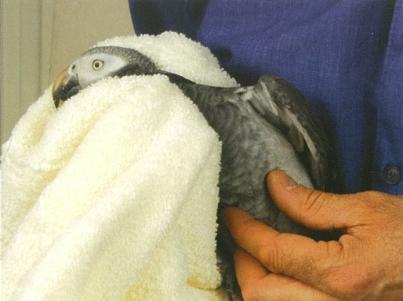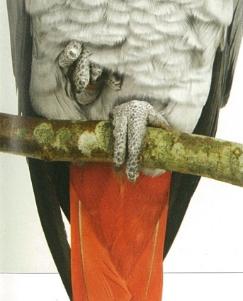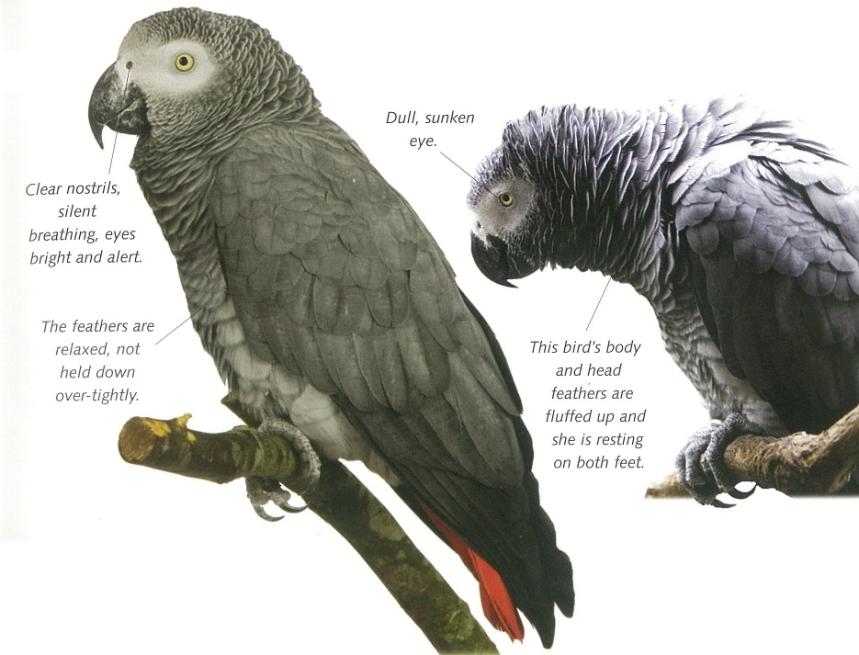Like may birds, greys tend to hide any signs of being unwell and try to appear 'normal'. They can do this right up to the point at which they are seriously ill, so you need to be able to recognise a healthy bird by looking for the telltale signs. Healthy birds are active for most, but not all, of the daytime. The eyes should be bright and wide open. There should be no discharge from the nostrils and the breathing should be silent. The bird should be alert and well aware of things going on around it. The body feathers should be in good condition. They should not be
fluffed up but slightly smoothed down. The bird should be eating normally and passing droppings normally, without undue straining. The area around the vent should be clean, not soiled by droppings. When at rest or sleeping a healthy bird usually stands on one foot.
Some birds that are sold as immature and 'cuddly tame', usually from a pet shop, do not reveal the true character that they will display when adult. Immature birds tend to show submissive behaviours to everyone. Consequently, there is an advantage in getting an older bird (generally from a private sale) as the bird's true character will be well-formed and there are unlikely to be any major changes to this. While older birds are often sold for genuine
reasons, many are also sold because their owners are experiencing problems with the bird with which they cannot cope. The most common of these are high noise levels, nervousness or aggression, so ask about these aspects of the bird's character as well. Often these behavioural problems are not difficult to address, as discussed later.
fluffed up but slightly smoothed down. The bird should be eating normally and passing droppings normally, without undue straining. The area around the vent should be clean, not soiled by droppings. When at rest or sleeping a healthy bird usually stands on one foot.
Consult an avian vet
Birds which are unwell will show the opposite of these signs: fluffed-up feathers, an inattentive disposition, sleepy with dull, perhaps half-closed, eyes. Where you see a bird which does not show the normal healthy signs, something may be wrong, so take care if you are considering purchase of such a bird. You can always ask the owner to have the bird checked by a specialist avian vet before you buy it and see the vet's report. Failing this, it is certainly worth having a vet check done within a day or two of acquiring the bird.Some birds that are sold as immature and 'cuddly tame', usually from a pet shop, do not reveal the true character that they will display when adult. Immature birds tend to show submissive behaviours to everyone. Consequently, there is an advantage in getting an older bird (generally from a private sale) as the bird's true character will be well-formed and there are unlikely to be any major changes to this. While older birds are often sold for genuine
reasons, many are also sold because their owners are experiencing problems with the bird with which they cannot cope. The most common of these are high noise levels, nervousness or aggression, so ask about these aspects of the bird's character as well. Often these behavioural problems are not difficult to address, as discussed later.

A specialist bird vet (far left) can examine a bird in more detail; this bird is having its chest muscle felt to determine its general health and muscle condition.

Healthy birds usually sleep on one foot and
hold the other up under their feathers.
hold the other up under their feathers.

Healthy bird
This healthy grey is in good condition,with a bright alert eye and clear nostrils
Unhealthy bird
This bird shows some signs of not being well.She appears inattentive and tired. Further checks on her condition should be made to assess her overall health accurately.